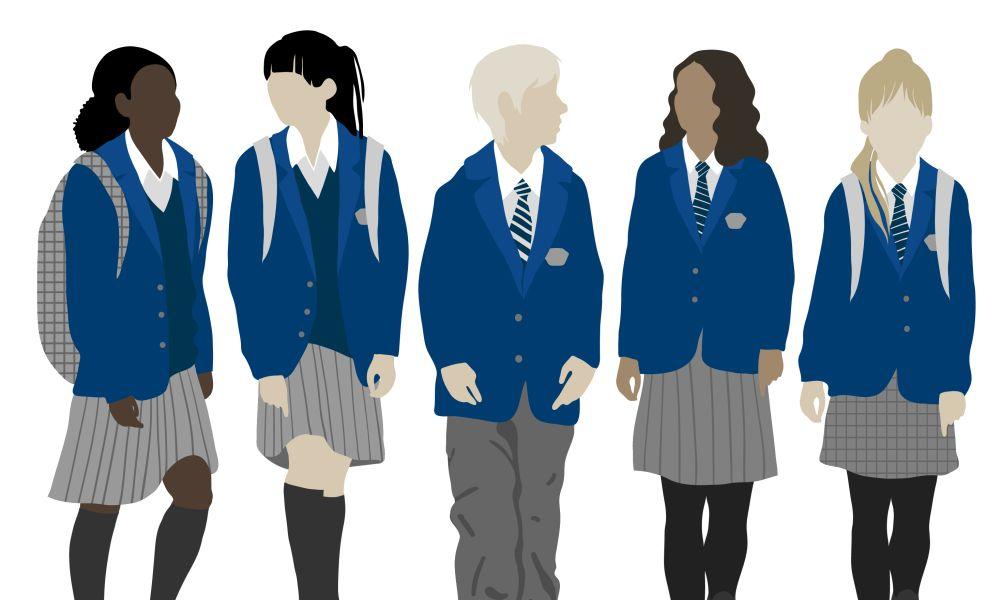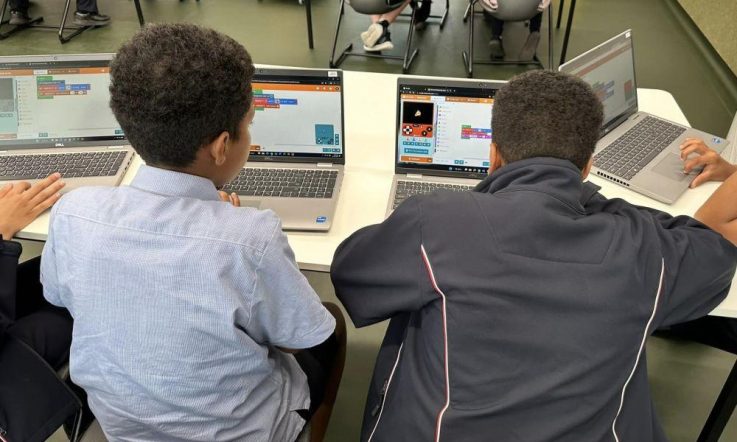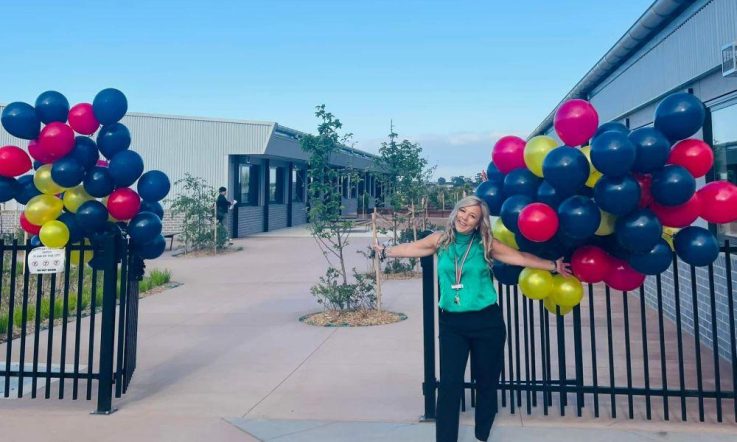Before we jump into this episode, are you subscribed yet to the free weekly Teacher bulletin? Get a weekly wrap of our latest content straight to your inbox. Join our community by clicking on the sign-up button at our website, teachermagazine.com.
Hello and thanks for downloading this podcast from Teacher, I’m Jo Earp. Welcome to Episode 8 of the School Assembly podcast series. So, if you haven’t heard this one before, we explore what it takes to build a school from the ground up and in Series 2 we’re following Jo Camozzato and her lovely team out there at Bemin Secondary College – now, that’s a dual campus site in the Melbourne suburb of Truganina. Thanks to my wonderful colleague Dom Russell for stepping in for Episode 7 last month, while I was exploring the delights of New Zealand on my holidays. But I’m back in the interviewing chair for this one, and our topic is meeting individual student needs. I caught up with Jo just before the Easter holidays to talk about differentiation, subject choices and external partnerships to bolster the existing staff expertise. I hope you enjoy the episode.
Jo Earp: Hi, Jo, thanks for joining me again. I missed out on our chat last time because I was away in lovely New Zealand but I'm back in Victoria now, although we are catching up online, and we're going to talk about meeting individual student needs today. That’s something actually you've spoken about a lot, I think, in our conversations and I know that you’re really passionate about the students being individuals, that they have their own interests, their strengths, their experience and everything they bring to the learning with them and then, of course, their backgrounds and their cultures too.
Jo Camozzato: Yeah, it is actually very important to me and it's good to see you again, even though you might be on the screen. I think it sort of stems also from my understanding of how kids learn, and when I say that it's really from my studies in educational psychology as well. So, you know, I have a bit of back knowledge on how to read and understand psychological cognitive assessments, language assessments, assessments to do with neurodiversity or ADHD, or what kind of screening and diagnosis goes behind these kinds of assessments. I suppose that's added to my own experience as a teacher and observing kids in the classroom and working with them.
And, of course, adolescence has always been a time where young people begin to explore how they are, as an individual. They, you know, want to wear their uniform a little bit different, they want to do sort of certain things in their bedrooms, you know, wreck up the paint, they want to add their own personal touches to their laptops, to their phones, everything that can identify them differently to someone next to them. But of course, it's always interesting because they still want to be part of the peer group. So, for me, I think the word differentiation and the emphasis on that has been part of my work for a long time. However, it's formally acknowledged in even our department document – the High Impact Teaching strategies, differentiation has its own chapter and section about what that looks like, what it looks like when it's being done well.
But it is a challenge for teachers because, more and more I suppose, in our schools, in our government schools, there is a range in your classroom and it's no longer one size fits all. It's very much about catering to the point of need to individual students and adapting resources or creating resources from scratch, or enabling kids to engage with the learning. And it's a hard skill because I don’t feel (actually, I take that back), it's been reported to me by many of my early career teachers, and many teachers, that this is not an area that is focused on a lot in teacher education. And so, when they're met with it in their classrooms, they can be very challenged. That skill’s not there yet. Some people are naturally good at it, because it needs a form of creativity, and others find it hard.
JE: It is isn't it, it's a very hard skill. in terms of subject learning then, you're a secondary school, so you're in that territory of electives – which is exciting – and that really throws open so many, so many possibilities these days. When I think about, you know, the choices I had, going back, and the choices that are available now, and particularly in Australia as well, which has also had that element of the trades and the VET kind of side of things. With this new school then, how have you've gone about meeting those individual student needs on subjects that they desperately want to study? I can imagine you've had to get quite creative sometimes to make that happen.
JC: Yes. Well, you might remember, it's sort of started back with us going into our P-9’s, our prep to 9 colleges, and my Assistant Principal actually sitting down with the year 9 students and doing learning profiles with them. What interests them? What do they enjoy? What are their strengths? What subject areas do they really want to explore further? Then we match those creatively with some ideas for student choices.
It's still been a challenge because, often, when you're 14 or 15, you choose something and you think it's going to be about something in particular, and you've read the blurb describing it, but of course then when you're in the actual classroom, or you're engaging with the program, it's not quite what you thought. So, even something as simple as Ethical Eats – we have students who have chosen a food elective, and they're cooking regularly, but some students have said, ‘Oh, I don't actually like cooking.’ Well, this is the subject. So, it's a realisation, ‘Oh did I like it as much as I thought I did? Now I'm supposed to be doing it once a week for a semester’.
So, I suppose whenever you're structuring student choice – while meeting the core, because we don't teach everything through student choice subjects; we deliver our core subjects English and Maths and Humanities to all our students separately – but I suppose you need to have a bit of flexibility to move students around out of things that they've chosen that they actually are not motivated by.
But that's the whole idea, isn't it? To see what you want to do and then realise, ‘Next time around I need to make a different choice that is about what I really want to do. I thought I wanted to do this, but it's not what I thought.’
It has taken a lot of collaboration with teachers, because teachers were given a skeleton idea and then they've had to flesh it out while they're planning everything else. But I think, overall, it has been successful, especially when I moved the timetable around so that they weren't all on the same day. It's added a different sort of evenness to the week and also given the teachers a bit of breathing space between when they take these different subjects that they're still planning for.
JE: Yeah, that's interesting to hear. You do get quite a bit of movement around, but I guess that's only natural. I mean, as you know, as adults, when we take a course, we’re like, ‘actually, I don't really fancy this one, now that I’ve started it’. So …
JC: Yeah, and you know, some people do that at uni. They start a course, and they realise they're paying money for a degree they don't actually enjoy, and if they're onto it, they move sideways very quickly into a different course or you change directions completely.
I mean the challenge for us right now is that after Easter, we have to also design what we're offering our students at year 11 and 12 – the final years of school – VCE, VM, VET, these are all, I suppose, what's to be expected, and we do want to offer all these pathways for young people, but we have that development running parallel to also reviewing and revising and adjusting our year 10 program.
Then, of course, in the scheme of all this, we've got our year 7s, and we mustn't forget them because there needs to be a plan made for year 8 and also further down the track, how does that feed into our year 9 program, what will that look like in 2 years’ time? You can't sort of plan one thing without having a vision for the other.
I suppose, when people hear about new schools, this is part of the complexity of the work – that's not all done for you. You’ve got to work collaboratively to do it and tap into resources outside the school, department people, anyone you can find really who can give you support in this way, and also to help develop ideas.
JE: So that's the thing I wanted to speak about next actually, expertise outside the school. You've got a lot of expertise within the school, and that's great, but we know that schools can't do it on their own, and particularly in terms of meeting different student needs. So, there's the subject kind of things, the electives and what have you and that kind of support. There's also mental health support, welfare support, support for families, things like language therapy, speech therapy. How do you go about bolstering that? Is that a ‘Principal job’ as like the figurehead of the school, that really you be the one approaching people, or is that something that you can delegate?
JC: It really depends, Jo. I suppose part of my role as the public ‘leader’ of the school, and the principals are often used for many things like that, I am always on the lookout or listening for potential partnerships and who I need to meet to bring in opportunities for the students.
So, as I was talking to my own team – my leadership team here about developing what year 11 and 12 looks like – you know, we've met with the WynBay LLEN and we're discussing with them VET opportunities for next year and how the cluster works.
At the same time, at the end of last year, there's a Department of Education-supported initiative called Head Start, which works with young people around school-based apprenticeships, and I have a Head Start person here who's based here one day a week, who works with other schools, but they're centrally based here. That was a strategic move to make sure that we have these connections as a new school.
In relation to the mental health, and I suppose allied health support, that takes a bit of time. It's not necessarily all part of my role. I mean, I am listening for funding opportunities, what other schools are doing, but I do have an Assistant Principal for Student Wellbeing and Engagement. I do have a mental health practitioner, 2 full-time youth worker counsellors, who also have their connections of what we can bring into the school.
But believe it or not, sometimes I walk through the yard, and someone will come bounding up to me, a student will say to me, ‘you know when I was at my previous school we did these really cool activities with Wyndham Youth Services …’ or with this local football club, or with a multicultural youth group, ‘… can we do something with them again?’ And I think, well, that's not a bad idea. I try to connect those students up with the staff member who maybe has that brief.
At this stage, some new schools have, but I haven't used my budget to employ or to support a speech pathologist or an OT. However, we do have access to the Department of Education Student Support Service offices, and we can request that support. In previous schools I've worked in, as the school has got bigger and our population has grown, I have certainly added various allied health individuals into the team, to give extra rounded support for our students. Because there can always be more services, that's probably a good way of saying it: there can always be more services.
I've also met some interesting people; I've started to meet with the police liaison officers to find out what's happening in proactive policing, we've met with people who work in the Department of Education in helping to establish senior school reform.
So, you keep trying to connect, as a new school, because some of them don't know we’re really here, or they've heard vaguely about us and they've driven past, but they don't really know what's going on. So, it is an ongoing (I suppose) responsibility of mine to continue to make those links and invite people into the new school community.
JE: So, we started by … you touched on differentiation a bit and I just want to return to that briefly before we ask the usual 3 questions. So, I was thinking, meeting student need on the academic side of things – we need to, firstly, find out where they're at (otherwise, we're not going to meet their needs). And I wanted you to pick up on something that you mentioned in the last episode. So, I'm going to quote you here, you said:
‘Differentiations is an interesting one because sometimes people go straight to the students who have more challenges, but I think we don't do enough talking around how you do differentiate to extend the students that are cruising along.’
I think that's a really great point. So, a key thing is for, firstly, your teachers to identify where students are at and always be aware of where they're at, so there's the monitoring inside of that, but then trying to push those at the top end, isn't it?
JC: Yeah. So, look, we did receive some data from some of our schools, learning data, as the students transferred into the senior campus and as they came from their primary schools into year 7, but not enough, really.
So, part of our assessment schedule for term 2, and the whole year level assessment schedule, we will be using some assessment tools, like PAT Reading and PAT Maths, to get baseline data. We will be using another reading tool for the junior students, the year 7s, called DIBELS, which gives us an idea of their reading level, just to see how that lines up with teacher judgement, which we can access through some Department of Education platforms.
So, we have a platform called Panorama here, where we can start to go in and have a look at what's transferred across, in terms of teacher judgement, for our students and see how all this lines up, along with our own common assessment tasks that teachers are doing now, collecting work back from students and assessing according to rubrics.
I do stand by what I say. I think if you're a student who's capable, that you're in the middle range, in the middle of that normal curve, you're not disrupting the class, you're capably doing your work, completing tasks, (I think we’ve all experienced it) there's a real danger of us not looking at, ‘well, how can we help that student achieve more?’.
I don't have the answers to all of this, but I think part of it is to discuss it, openly. Because where do we go first? We go to the young person who will express that they're not engaging with learning by acting out. Their behaviour is a communication tool, and they will disrupt class, or not want to attend a class, or cause something to demonstrate ‘I'm not understanding the work.’
When you understand the work, you might be a little bit cheeky, but there's not too many of those. Usually, you're quiet, usually you're relaxed, usually you're cruising, you feel proud of what you've achieved, but no one's really seeing if you can do more. So, I suppose the challenge for all of us in this space in schools is to go, ‘well, what's in our curriculum documentation? Are we actively discussing and planning for stretch?’ So that's got to be there, even in a physical format in the documentation, stretch, nearly underlined, at above level. Even at level, what's the stretch for at level?
Discussing it is very important. And then I suppose being aware that in a staged response – because you can't do all this all at once when you're building teacher capacity and the school culture, helping your leaders become leaders, really – but in a staged, planned response, how do we tackle building teacher skills in this area, and identifying and supporting the students to identify they can do more?
There are lots of ideas around that. Is it students setting their own learning goals? Are they setting learning goals that are aspirational? So, it's a complex area, but I think even in my role previously, I haven't discussed it enough. I haven't mentioned it enough. I think this time it’s a bit more at the forefront of my own brain that we need to go there earlier. We shouldn't be waiting for this; we need to have this discussion simultaneously as we work with students who need differentiation because of their learning difficulties. The rest need it, as well, for other things too.
JE: OK, then. So, before we go, as I mentioned, the usual 3 questions, then. I've changed this first one, I'm not going to say hurdle anymore. I don't think either of us liked hurdle. I'm going to say challenge rather than hurdle, key learning, and proudest achievement since the last time that Dom spoke to you actually, which was last month.
JC: Yeah, I'm going to go back to boring old time. Time is really, I don't know, I mean, I know the time goes fast. You can even probably hear it in my voice, people listening to this, that I'm a bit raspy. I feel like I’ve run out of time this term and thinking already of next term, and we have a lot on our plate: the senior school registration coming up, all the paperwork and documents and policies and course outlines have to be in by the end of June. I feel like a student; I don't know if we've really started. We have got timelines and we're moving towards putting more pen on paper, so to speak. We've started, but it is a pressure, while we continue to build school culture and get to know our families as well. So, it is it is a challenge, time. Time for myself, time to work with others. And just time in the week, literally time in the week.
JE: Not good.
JC: Mmm. No.
JE: Key learning and proudest achievement?
JC: I'm not sure if we had our family BBQ since we last spoke? I persevered with the year 7 Welcome BBQ with the families, despite there being lots of weather forecasts of extreme heat. I kept cancelling, and the fact that that eventually went ahead with over 200 people, and we only have 114 year 7s, was really quite remarkable and exciting. But, it was more about the dialogue between the parents and the teachers, and how proud and excited they were to be on the Junior School campus.
Running parallel with that, as many schools around Australia would know, this is nearly the end of Harmony Week, and next Tuesday I've set up an opportunity for parents to come to the Senior Campus. I've invited all parents though, across the school year 7 to year 10, to participate, in the middle of the day, in a multicultural celebration morning tea. Sometimes people look at me and go, ‘Who's going to come to that? They're all working’ and I go ‘Oh yeah. Just see’. It's interesting, by using some very key words, what happens. So, I have 40 parents booked in at 10 o'clock next week, which is actually a big achievement when you've only got not that many students. I suspect there will be more, and I will invite Student Leaders and other students who've performed as part of Harmony Week celebrations to come along.
And I'm really excited about that, because yet again, for me, it shows that if you approach the wider community and our families in the right way, that they will come, they do really care about their children, they just want to feel welcome and they just want to feel that they can come into the school and talk about what's important to them. So, I look forward to that next week.
But even though it hasn't happened, I think that's a really big achievement for us, in making sure that we are covering all the things we want to do in 9 weeks, because it's only been 9 weeks when we get to the end of next week, and there's been a couple of public holidays in there and curriculum days at the start. So, it's a bit of a whirlwind really at the beginning of the year.
JE: I think there's a lot to celebrate and it's great that you keep celebrating things as well and doing these events where you bring people together. Sounds like you're making some fantastic relationships there with the parents and the communities. So, well done on that. I am going let you go now and rest that voice; maybe grab some honey and lemon. And you have a fantastic Easter break. Do manage to grab a rest, hopefully and I'll catch up with you next month.
JC: Thank you, Jo.
That’s all for this episode, thanks for listening. If you want to keep listening now, you can access more than 300 episodes in the Teacher archives – just head over to teachermagazine.com, or wherever you get your podcasts from; there’s plenty there to keep you busy. And to be absolutely legendary, if you could please leave a review on the podcast channel to help other educators like you to find the podcast, that would be fantastic – it’s also a really great support for the Teacher team.
Before you go, are you currently subscribed to the weekly Teacher bulletin? It’s a free weekly wrap of our latest content straight to your inbox. Join the more than 40,000 educators who are already part of the community by clicking on the sign-up button at our website, teachermagazine.com.
Other episodes in this series:
In this episode, Jo Camozzato discusses meeting individual student needs academically. An important starting point is teachers knowing where students are in their learning. How do you establish where students are in their own learning? How often do you update this information? How does that feed into you planning and next steps in teaching?



